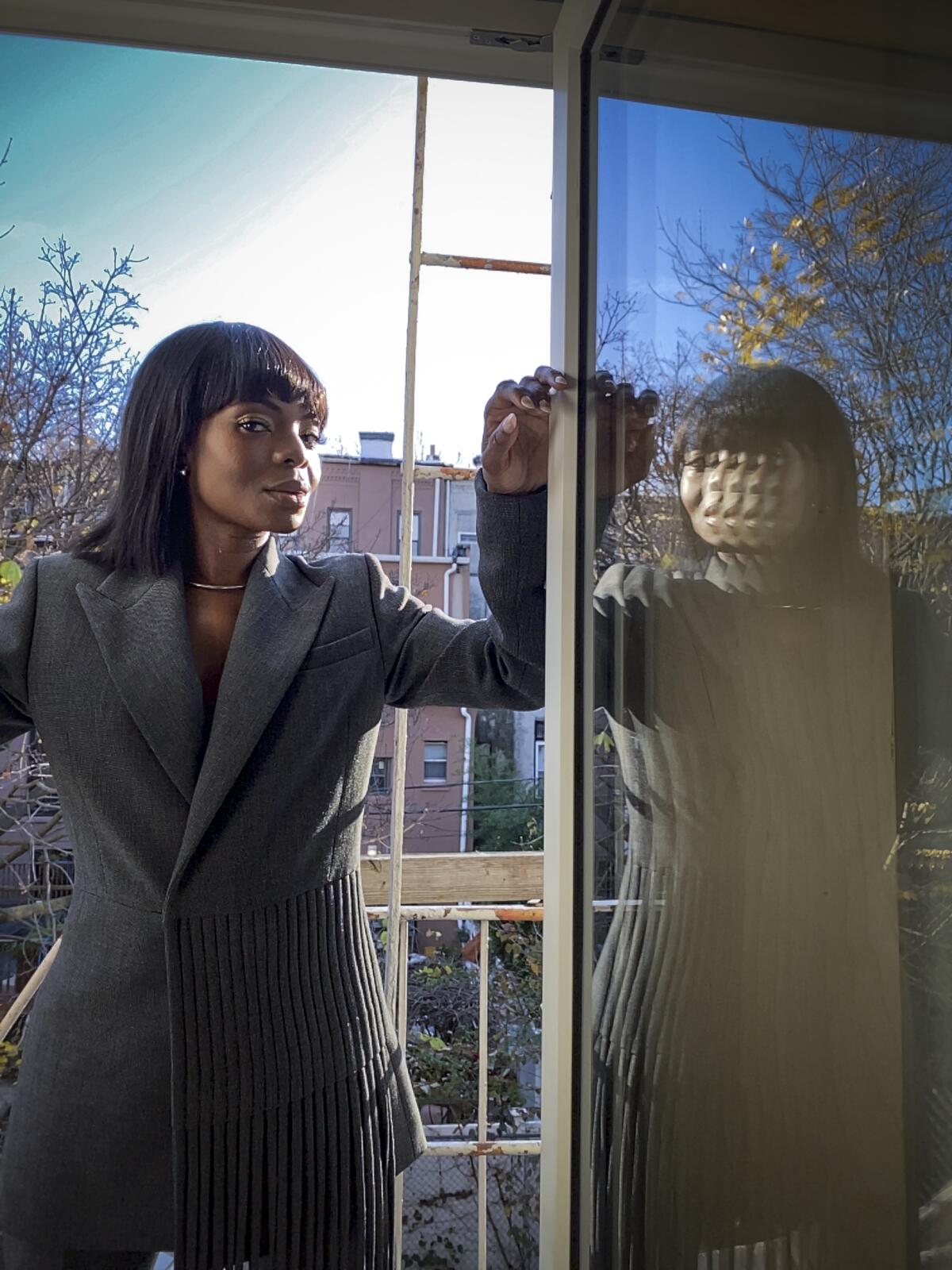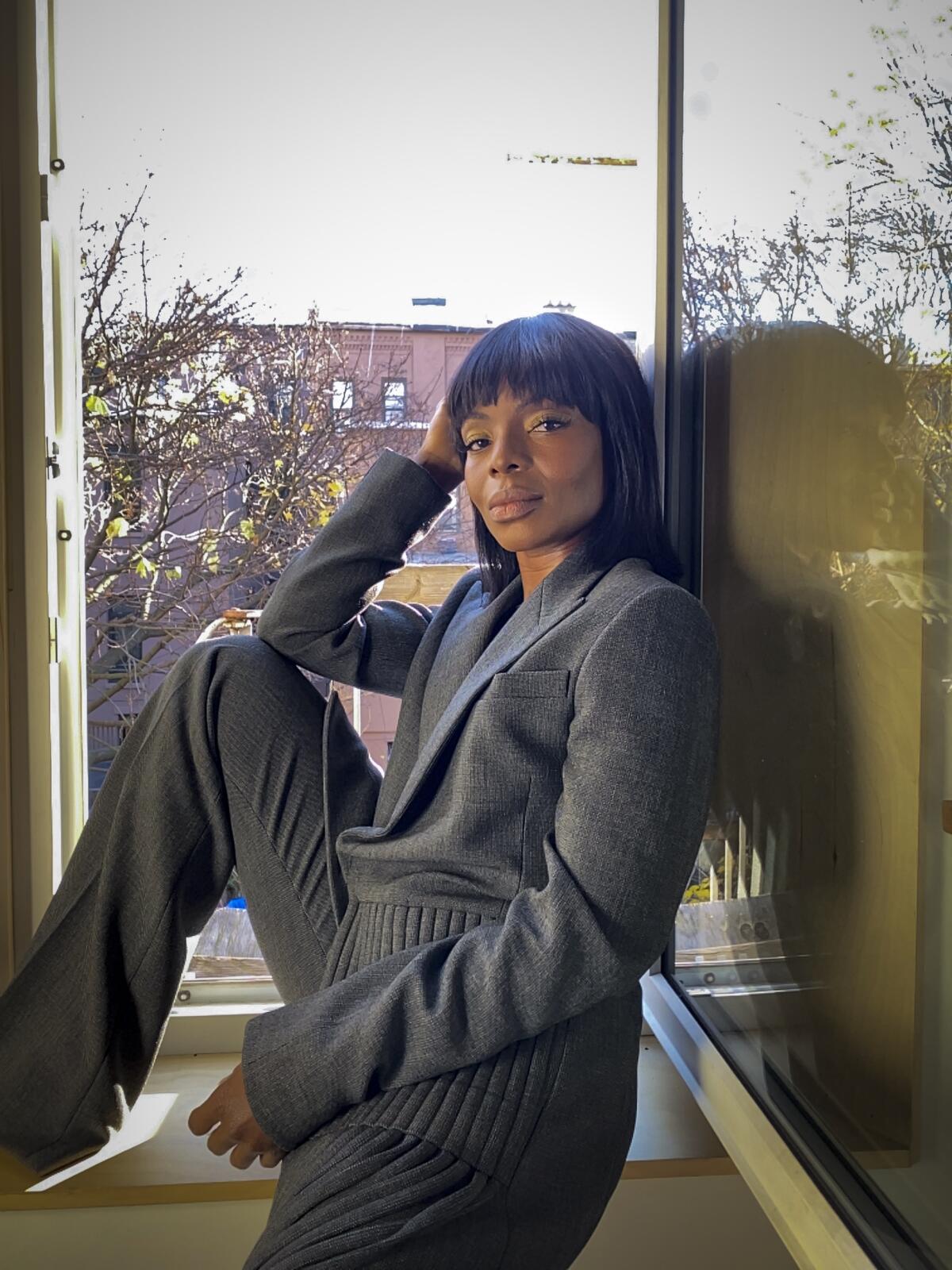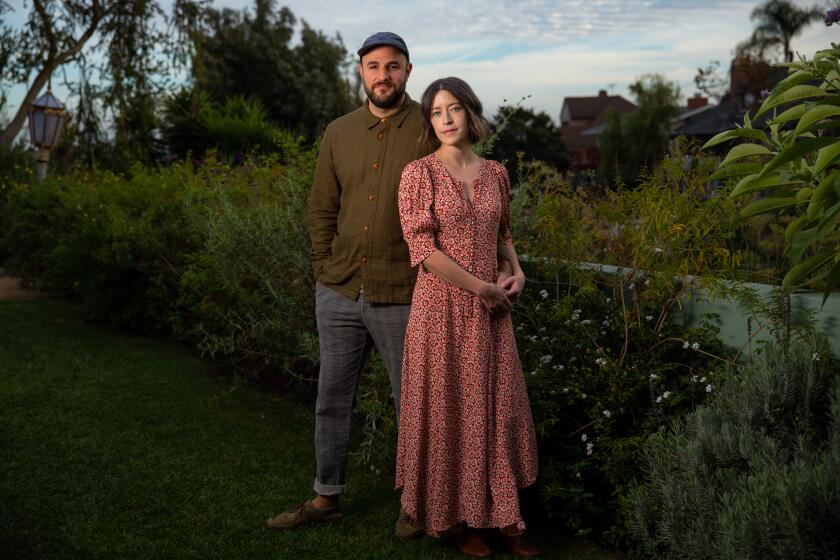After a stellar run of standout roles, Marsha Stephanie Blake is ready for more

- Share via
Marsha Stephanie Blake logs onto the Zoom call looking like a million bucks. It’s noon on a weekday in December and the “I’m Your Woman” actress is calling from New York, where among other things this year she’s celebrated virtual movie premieres, attended protests, sewed masks for essential workers, campaigned to get out the vote and filmed a Netflix show inside her home with her family during the pandemic.
In such an unprecedented year, multitasking has been a big part of Blake’s life. “I was getting all dressed up because I have to tape an audition,” she explains with a laugh. “Normally just to talk to you I would not look like this. I would look like I’m in remote school all day long, with a first grader!”
Among the year’s stellar supporting turns, Blake’s performance as Teri in Amazon’s 1970s-set crime thriller “I’m Your Woman” stands tall. In her nearly two decade career, the last few years in particular have seen the character actress flourishing on film and TV screens in indelible roles such as Rosemary in 2019’s “Luce”; opposite Viola Davis on “How to Get Away With Murder”; and as Linda McCray, the devoted mother of wrongfully accused Antron McCray in “When They See Us,” for which she was Emmy-nominated.
With director Julia Hart‘s “I’m Your Woman,” Blake embraced a character who’d already been through the ringer and come out stronger for it by the time she enters the picture. The film begins when the genre often sidelines female characters: suburban housewife Jean (“The Marvelous Mrs. Maisel’s” Rachel Brosnahan) is sent off into the night with a bag of cash and an infant son after her husband’s criminal shenanigans go awry. With the help of his associate Cal (Arinzé Kene), Jean learns to take the wheel of her own destiny for the first time in her life.
How director Julia Hart spun a fresh take on the 1970s crime flick in her new Amazon film, “I’m Your Woman.”
But it’s her budding friendship with Cal’s guarded wife, Teri (Blake), who grudgingly takes the naïve Jean under her wing, that fuels their shared journey and anchors the recentering of the female experience. Casting for the perfect Teri, star and producer Brosnahan pitched one name: Marsha Stephanie Blake, with whom she had starred in “Othello” in 2016 at the New York Theatre Workshop.
Now, says Hart, “I can’t imagine anyone else playing the part. It’s done with such strength, but also such kindness. She’s a powerhouse and I’m excited for people to see the work that she’s done in this film, because it’s stunning.”
Before that taped audition she had to get to, the Jamaica-born and Jamaica, Queens-raised Blake, also seen this year in “The Photograph” and “An American Pickle,” looked back on her “I’m Your Woman” role, her stage and screen career, and the challenges and joys of turning the family home into a virtual production hub earlier this year.
We haven’t seen a lot of women like Teri in the movies. She’s fierce and capable, she has a tender side, and she carries such a quiet power.
I loved the character of Teri for so many reasons, and a big part of it was that I often have played women in the middle of a traumatic event. And a lot of what I’m going through are very intense, emotive, emotional, quite heartbreaking things. And what I loved about Teri was that we were meeting her after that trauma, and she was now helping someone else navigate that. I loved her strength and her silence. She doesn’t speak a lot. She’s a still waters run deep kind of woman, and I loved that about her.
There are several temperature shifts in her dynamic with Jean, and while it’s called “I’m Your Woman,” inspired by a line Tuesday Weld says to James Caan in “Thief,” arguably the most important relationship in this film is actually between these two women.
What’s also lovely about Teri is she’s kind of a reluctant helper. She’s coming in like, “I know the ropes and I’ll try to show you,” but she’s doing it reluctantly. Because [Rachel and I] already had a relationship outside of the film I had to remind myself how I actually felt about Jean. A lot of the inner work was always remembering that Teri is a woman who is now at a point in her life where she doesn’t let people in easily. There’s a wall, and there’s a reason there’s a wall — it’s for protection, it’s for her family, and it’s for survival. And Jean is everything she was and doesn’t want to be anymore.
What did it add to your performance to have input into, say, how Teri might dress or the image she presents to the outside world?
These choices are not ones you’re always a part of as an actor. There have been times where no one asked me; I was a mannequin, and they put clothes on me. With “I’m Your Woman” [costume designer] Natalie O’Brien, we had a conversation — I did the same thing with my hair and makeup people — and usually no one talks to me, but this was people calling me saying, “What do you want? What do you like? What don’t you like?” I felt so empowered. Natalie helped me craft an idea of Teri: even though she has this wall, her wardrobe was conveying a warmth that maybe she herself was trying to hide or resist.
She has these incredible trench coats that also convey her strength and her confidence, and it made me feel really tall. I have a problem that I think I’m taller than I actually am! But she dressed me in the scenes that I had to feel power and confidence, and I definitely felt that. It would be me throwing my hands into a trench coat and I’d be like, “Yes. Let’s go.”
Teri is a woman who is now at a point in her life where she doesn’t let people in easily. There’s a wall, and there’s a reason there’s a wall — it’s for protection, it’s for her family, and it’s for survival.
— Marsha Stephanie Blake
For what it’s worth, Teri seems about 10 feet tall in so many moments in this film. Her presence is so powerful.
Yes! That’s what I wanted!
Rachel Brosnahan, who plays Jean and is a producer on the film, was instrumental in bringing you into this project. You had acted together onstage in “Othello.” How did she first bring it up?
The first time she ever mentioned it, we were out. We’d be each other’s dates for plays every once in a while. I remember I was running across the street, it’s the middle of winter, and as soon as I got to her she immediately said, “I pitched you for this film!” And I was like, “Oh, great! Hi!”
I figured if she was pitching me then it was real, because I’ve always known her to be a woman of her word. In my experience an actor never really has that much power unless they’re Meryl Streep or Tom Cruise. I didn’t realize that she was the producer on this and might have a little more say in who was being cast, or that it was a project for Amazon. It wasn’t until I got the script and it said “Read for interest” [that I realized] it wasn’t an audition, they wanted me to read for my interest. I was like, “This thing is actually real!”
You filmed car chases and nighttime stunts on this film, and on the opposite end of the difficulty spectrum, some of your costars were actual babies. What was life on set like?
In [one] scene we had to eat peas over and over again, and whenever you have food and babies and you have to eat real food over and over again it can get a little bit tricky, because no matter how good the food tastes, by the 20th take you’re like, “I will never eat peas again for the rest of my life.” But we were all in it together. And Julia herself is such an amazing artist, but she’s also such a mom that she was always concerned about how we were feeling. She was always like, “Are you guys OK? I’m going to eat some of these peas to make you feel better.”
Maybe it was because of the babies on set, but everybody brought their good energy. I could bring my kids to the set and I didn’t feel weird about it because Julia was like, “Bring the kids!” My oldest wants to be a director and she was so psyched.
There was one union African American makeup artist in Pittsburgh [where the film was shot]. One! And Julia got her for me. And in the hair department, we have gone through Black women coming forth and saying, “Can somebody please address this hair problem that we have to deal with on set when it comes to our hair … .” I don’t even think it’s a micro-aggression, a lot of times it’s a macro-aggression. And Julia said, “You don’t have to change your locs. I found someone who did research and found locs in the ’70s.” It was such a relief to hear a director say, “Come as you are.” Just to hear someone be like, “You’re fine, your hair is beautiful, we found someone who is excited to work on your hair with you and do whatever you want to do.” That’s a big deal.
You’ve worked extensively in film and TV, but beyond leading to film roles like “I’m Your Woman,” why has your stage work also been an important foundation in your career?
What I love about the theater are the relationships you build. Weirdly, because you’re getting paid less and you spend more time doing it, it feels more like a labor of love than anything else. The reason I became friends with Rachel, and which led to us doing the film together, was because we’d done a theater piece off-Broadway together, this tiny little theater where we were arm’s length from each other in the dressing room. We did that for months and you get to know someone when you do that, for good or for bad. It’s like summer camp. And you learn a lot watching other people work. You’re there in rehearsal sometimes for hours, watching other people rehearse. That is the best education you can get as an actor.
Like watching Al Pacino bring a dog-eared copy of “No Fear Shakespeare” to rehearsals on “The Merchant of Venice” on Broadway …
“No Fear Shakespeare”! The cheater book! I was like, what! I used to work with this company called the Shakespeare Society and we would go in as actors and do Shakespeare with kids, and I tell that story all the time because they’re so intimidated by Shakespeare. And I’m like, “Listen: None of us understand it, but we’re going to work it out!” And if we need to look at the “No Fear Shakespeare,” we’re going to do that. I hope Al doesn’t hate me for telling that story. I think he’s fine. We all need all the help we can get.
You grew up in Jamaica, Queens, New York after moving from Jamaica at age 10. How did that experience shape you?
I was a top-performing student in Jamaica at the top of my class, so by the time I got here I skipped grades. I had an older brother and older sister, but I was obsessed with everything my older sister learned, so I was reading Toni Morrison and Maya Angelou by the time I was 7 or 8. And to be extremely honest I think there was a bias in my school of, “She’s an immigrant, so she might not know anything.” I don’t think they realized how rigorous the schools are in Jamaica.
I also felt pressure as the child of an immigrant and an immigrant myself, where you feel like, I have to be a top performer all the time. The idea is you come to America to make a better way for yourself, to be in a better position in life than your parents, so you’ve got to do it, do it, do it. It’s stuff I try to instill in my kids now without the heaviness, but I do think that there’s something about being appreciative of what your parents are doing and what people before you did to get you to where you are now, and acknowledging that other people are part of your journey.

Were you drawn to the arts as a child? Did you imagine being a performer?
Not when I was a kid. I wrote a lot; I wrote books, I wrote plays, I wrote my versions of movies. I read so much Maya Angelou and Toni Morrison, I was like, “I’m a writer! I’m a poet!” I didn’t do any acting until I was in high school and I joined a drama class for fun and I loved it. I got to play a teacher and I had a very funny moment in the middle of a performance and got a big laugh, and when you get that big laugh and you’re a performer, that’s it. You’re like, “This is what I want for the rest of my life.” I’ve been trying to re-create that moment for the last 25 years. Or however long. I don’t know how old I am anymore, I lie about it so often. [Laughs]
In recent years you’ve given incredible performances in projects such as “When They See Us” and “Luce,” to name a few. Have these characters felt particularly meaningful to you?
I love the difference between [Rosemary in] “Luce” and Linda McCray [in “When They See Us”] because while I have all of them in me, they are not me. Maybe a bit of Linda McCray, that mama bear, is more who I am. Maybe a little bit of Teri. But Rosemary? I don’t feel like that’s me. However, there but for the grace of God, right? Because it could just take an incident for that to become me. An incident, a break, a physical or emotional trauma, anything. So I always think that as much as I feel like those characters are different from who I am, they are a part of me. They are me.
Rosemary is one of the few roles that I can watch myself in without wincing because she doesn’t look like how I outwardly present myself to the world. Not so much with “How to Get Away With Murder,” with Viola Davis, which I was so lucky to do. Again, heroes! I’m working with people I’ve looked up to for forever. It’s harder for me to watch myself in “How to Get Away With Murder” than it is to watch myself in “Luce,” because “Murder” is so much closer to how I am as a person.
People keep asking me, “What do you want to do next?” Listen, I am happy with what I was doing. If anything I want to write more and maybe get more into the behind the scenes stuff — producing, writing, maybe directing down the line. But I was pretty happy with my work. And this is hindsight, right, because in the moment I’m never happy! In the moment I am stressed out, I feel like I have to work harder and try harder and do more. But as a whole, I am happy. I just want to do more.
Speaking of going behind the camera, a unique project you made this year was “Social Distance” for Netflix, which was filmed during the pandemic. That’s not something many people can say they did, especially the way this project was made: with your husband and two daughters, shot in your own home with a virtual crew. Why did you say yes?
I had been in the house with my kids from March 12, so by the time May came around and they were like, “Do you want to try to do a show in your house?” I was like, “Please, give me something to do!” When Netflix came with this offer, they said, we want to use you and one of your kids and you guys do all the work. At the time the proposal sounded exciting: Something for all of us to do, that involved my entire family.
It was definitely more work than I ever thought it would be. I mean, there’s a reason you have all of those people on set. Now imagine that’s just you and your family of three other people. And the fact that my kid was an actor in it meant I had to be Mommy, catering and on-site director. When she’d have a tantrum and run away, I was faced with five Zoom cameras of the actual director and the crew and the AD just looking at me like, “When do you think she’ll be back?”
It was insane, but I would totally do it again. I compare it to having a kid. When you’re having a kid, when you’re in labor, you’re like, “I will never do this again. This is ridiculous. I don’t know why people have done this since the beginning of time.” And then you have this beautiful little kid and you’re like, “I just want another one.”
More to Read
Only good movies
Get the Indie Focus newsletter, Mark Olsen's weekly guide to the world of cinema.
You may occasionally receive promotional content from the Los Angeles Times.










